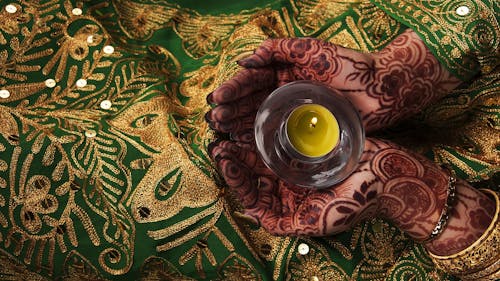How I learned to embrace my Indian heritage

As you can probably guess from my name, I'm Indian.
My parents were born in the land of budding culture and extravagance, enriching my life with delectable foods and beautifully elegant outfits.
But because I was born in Pennsylvania, I grew up identifying as an American — every aspect of my experience has been disconnected from where I come from, forming a convoluted relationship with my culture.
Although I can understand Hindi when it's spoken, I never learned to speak it. I've visited my family in India several times, but I'll never know what it’s like to live and grow up there.
When I was little, I didn’t have inhibitions about my roots. I would gladly watch Bollywood movies with my family and dance to Bollywood music on the coffee table as a baby. I grew up in a town with a significant South Asian population, which had both its benefits and drawbacks.
Since I was automatically placed among my Indian peers at school, I was associated with obedience and book smarts. But, just because we were large in numbers, doesn’t mean long held stereotypes about Indians didn’t prevail amongst my white classmates.
Being a short, naive Brown kid in elementary school was a recipe for getting picked on. I was automatically pinned as the "goody-two-shoes" averse to breaking rules. I found that Indian people had to prove themselves to be cool — they weren’t seen as cool by default.
But, there were celebratory moments, like when I would go to school in Indian attire every year on Diwali and receive compliments on my outfit, or when I would bring Indian food to lunch and be hounded with requests for a piece of my roti.
The stigma surrounding Indian culture became more pertinent as I got older. In middle school, I found myself striving to be the typical white girl, dressing in Aeropostale sweats and Uggs and indulging in white trends. I read "Seventeen Magazine," which had white faces plastered on it every month.
Growing up, I watched shows with little to no Asian representation, and if there was, it was the stereotypical, unfashionable, nerdy brown kid (I’m looking at you, "Jessie"). I wasn't conscious of how I was being white-washed. I willingly participated in it.
I also noticed the way people skeptically eyed my Indian peers who would express their cultural roots by speaking their native language or eating Indian lunch. People would make off-hand comments about Indian people, including their accents and the lengths of their names.
This brought on feelings of shame about where I come from and impressed me to further distance myself from my cultural background. I slowly became disinterested in Hindi movies and pop culture. I would feel embarrassed when Bollywood songs would play on the loudspeakers at school during the month of the South Asian Show.
That’s not to say Indians weren’t given a platform to express themselves at my school, but it was fear of judgement and desire to assimilate that barred me from embracing my culture. I can’t imagine how it feels to be an Indian kid growing up in an area with little to no South Asian representation.
It’s not hard to internalize heavily ingrained stereotypes about brown people and immigrants — even as a brown person. Even while writing this article, I realize that I rarely talk about aspects of my culture or engage in Bollywood media.
Colorism plays a factor in this too, as people have sometimes opined that I look racially ambiguous. But, now is not too late to reconcile myself with the background that my parents brought me up with and celebrate it.
I’m obsessed with Mindy Kaling and have watched Priyanka Chopra in movies since I was 5 years old. I love that Indian weddings entail a week of boisterous events, dancing, heavy and intricate lenghas and an all-you-can-eat buffet. I love how expressive the music is and how dramatic the movies are.
You can never condense Indian culture into one thing. It's a land of a myriad of languages, customs, religions, lifestyles that vary from state to state. We aren’t just smart and successful — a stereotype that can be really damaging — we have different interests, aspirations and ways of expressing ourselves.
I learned that Western culture looks at the rest of the world through a very narrow lens perpetuated by historical events and nationalism. The more we are aware of this the more we can strip ourselves of the biases about our own culture and embrace where we come from. I’m still working on this, and I know girls like me are too.
It’s 2021. Society has progressed past the need for whitewashing and immigrant shame. The fact that we’re not basic is something to be celebrated



